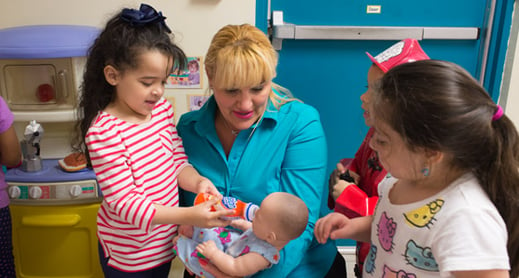
Imagine classrooms filled with children who are comfortable taking risks, sharing ideas, and working cooperatively with their peers. Can this become the norm in classrooms across the nation? Yes, because this is what consistent and effective Educator Sensitivity (ES) cultivates in the classroom. Research tells us that educators who are aware of and respond to each child supportively facilitate the ability of all children in the classroom to explore actively and learn.
Educator Sensitivity is not about how “nice” or “caring” educators are; rather, it is about how educators consistently demonstrate awareness and responsiveness to children’s current academic and emotional abilities and needs.
As a coach, enhancing this dimension can be very challenging. ES is inherently a sensitive topic and can easily cause educators to become defensive. So, how can we discuss ES without the conversation becoming too personal or feeling judgmental? Here are some helpful tips:
- Begin by expressing a message like this to your educators: “The CLASS framework values you as an educator and seeks to enrich what you love about working with children. CLASS provides you with the knowledge and tools necessary to become more intentional in your daily decisions about how you interact with children so that your words and actions will best support children’s learning and development.”
- Explain that ES, as defined by CLASS, is an action, not a feeling. Therefore, it is important for coaches to keep conversations primarily based on observable educator behaviors and children’s actions. Help educators reflect upon a specific time when they made a decision to respond to a child’s needs. Ask: “What was it that made you aware of the child’s needs in that moment? How did you respond? What effect did your words or actions have on the child? What did the child do next?”
- Discuss how ES is about accepting children where they are at in their academic and emotional journeys. It is being aware of and responsive to children’s daily needs and then providing a secure base from which they can blossom. Talk about how you, as a coach, do the same for educators. You communicate expectations, scaffold growth, and empower educators to own the role they play in children’s development--all from a position of acceptance for where each educator is at in her current teaching practice.
- Be intentional about demonstrating coach sensitivity in the moment. As you talk about ES, notice how your educator is reacting. Make every effort to genuinely elicit, listen to, and respond to their thoughts and concerns. Try to understand their feelings and encourage them to see you as a source of support. Ask reflective questions such as: “Based on what we’ve been talking about, what are your thoughts right now? How can I support you in actively exploring this dimension in your classroom?”
Genuinely being “in tune” with those we support and educate is a goal worthy of striving toward every day for both educators and coaches. It supports learners who are able to share their ideas freely and challenge themselves frequently. The most exciting thing is that both educator and coach sensitivity are behaviors each of us can learn about, practice, and perfect. Let’s start today!
Originally published January 27, 2016

